Insurance protects against fire damage and loss
Carelessness, open flame, electricity or arson – a fire starts for many different reasons. It only takes a few seconds for a fire to spread and for dangerous fire smoke to fill a building. In the blink of an eye, fires can cause immense damage to property or, in the worst case, even injure people or animals. Damage can quickly amount to huge sums – sums in the five-, six- or even seven-figure range. The only good news here is: You can protect yourself well against these costs and financial ruin because insurance will protect you in the event of fire damage.
What will each insurance policy pay for?
Depending on the type of damage, either building insurance, household insurance or private liability insurance takes effect. These insurance policies will then reimburse the replacement value, current value or the replacement cost of the items covered by the policy.
Residential building insurance
Building insurance, also called residential building insurance, covers damage caused to the building by fire or extinguishing water. However, it also covers the costs of the fire brigade, hotel costs if the property is uninhabitable, and the costs of clean-up work. In a nutshell: The residential building insurance covers the costs of repair or reconstruction up to the local new building value. In a tenancy relationship, the owner's or landlord's insurance generally applies. As a tenant of a rented flat, you do not have to worry about such insurance.
Home contents insurance
Home contents insurance covers the costs of damage to inventory and all movable property. This includes items of furniture, electrical appliances, but also valuables such as cash, gold or works of art. The replacement value or the replacement cost and the repair up to the agreed sum insured will be reimbursed. Depending on the individual package of insurance, you can also have transport and storage costs or guarding costs covered by the home contents insurance, for example. All owners of a dwelling, whether tenants or owners, should take out home contents insurance.
Personal liability insurance
As soon as third parties are affected by the fire, i.e. your neighbours or the owners of adjacent buildings, the personal liability insurance of the causer comes into play. This insurance always covers the costs if claims are made by other persons. It does not matter whether there is personal injury or damage to property. The benefits of personal liability insurance are also individually dependent on which insurance package has been booked. Depending on the contract, damage to rented property, financial losses or even recourse claims can be covered. A right of recourse arises as soon as the policyholder has received a benefit from their insurance company, although, as later becomes known, they themself are to blame for the occurrence of the claim or have partly contributed to it. However, this does not mean that the insurance company does not pay at all. In the event of a recourse claim, the insurance company usually pays the injured party's entire benefit first. After that, the insurance company then contacts the policyholder to make its right of recourse clear. Depending on the type of insurance, the entire benefit paid out must then be repaid or an amount in a lump sum.
How do companies insure themselves against fires?
Companies in particular should also protect themselves against the financial loss of material assets in the event of a fire. In the case of companies, the building fabric is insured via the building insurance, as is the case with private owners. If the business equipment or goods are destroyed, this is covered by the contents insurance: This is a home contents insurance for companies. Entrepreneurs should also bear in mind that after a major loss, it is usually not possible to return to normal operations or continuous production immediately. Months quickly pass before a company can resume normal production after a major fire. Companies should therefore not underestimate the risk of a loss of earnings. Fire-related business interruption insurance is available for such an event. This pays for the lost profit during this time.
When will the insurance pay?
But watch out! Just because an insurance policy has been taken out does not necessarily mean that it is liable in the event of a fire. This is because there are reasons why the insurer may not have to pay for the fire damage, or may not have to pay for it in full.
When is a fire considered a fire?
A fire is said to have started when fire leaves the intended hearth or has started without such a hearth and spreads even without any external influence. The whole thing becomes easier to understand thanks to an example. Let's imagine a fireplace with a fire burning in it. The fire is in the fireplace in its intended hearth, i.e. in the device provided for it. But if a spark jumps out of the open fireplace and ignites a fire somewhere else, a fire starts that could have serious consequences and costs.
Insurance trap: Under insured?
Being under insured? Yes, that really exists. This is because your property or building can change greatly in value, for example by adding an extension to the building over the years or investing in expensive fixtures and fittings. This creates a difference between the originally agreed sum insured and the actual value of your property. Therefore, always speak to your insurance company about this if anything changes in the value of your building, so that your insurer can adjust the insured value, and you are fully insured at all times.
Tenant or landlord: Who is liable?
As soon as the tenant has not caused the fire by gross negligence or intentionally, the landlord or their insurance company is liable. So if you are not to blame for the fire, your landlord is obliged to take care of the damage. If they do not comply with this obligation, you have the right to a rent reduction. However, the landlord is not responsible for damaged furnishings. As explained earlier, valuables must be replaced by the tenant's home contents insurance.
In these cases, the insurance will not pay
If a fire is started wilfully by a third person, your insurance will cover the damage. If, on the other hand, you start the fire yourself with the aim of causing an insured event, you are acting intentionally. In this case, your insurance will not pay for the damage. But not only that: With intentional arson you are liable to prosecution for insurance fraud.
In the event of a fire, insurance cover is only provided if the fire damage was unintentional. Whether gross negligence is covered depends on your individual insurance policy. Gross negligence means that in everyday life the normal and necessary care is violated to a high degree and that a person no longer acts according to common sense. Therefore, should you leave open fires or appliances with fire unattended and leave the building, it will be considered gross negligence if a fire should result. The same applies to the improper handling of technical objects and their lack of security.
How to proceed correctly after a fire
Did you actually have a fire? There are some tips on how best to proceed properly after a fire. We show you how to proceed, step by step, after your building has been cleared by the police and fire brigade:
1. Ventilate your building well to get rid of the smell of smoke. In addition, do not use electrical appliances in rooms that are covered with soot.
2. It is imperative that you document your damage. Take photos of the damaged objects and any visible damage to the building. It is very helpful if you make a list of all the objects that have been damaged, including the year of purchase, purchase price and replacement value.
3. Inform your home contents, building or personal liability insurance and discuss the further procedure with your insurer.
4. Contact professionals for fire damage restoration. Especially in the case of major damage, it is advisable to commission a specialist with fire damage restoration. The costs are generally covered by the insurance.
5. Clean sooty objects. You can remove minor soiling yourself if you protect yourself sufficiently. Wear a protective suit, respirator and gloves when doing so.
Preventive fire protection protects people and property
In Germany, the most common cause of fires is electricity. This is followed by human error and arson. There are some sources of danger for fires in the home and precautions to combat them. In any case, you should regularly check the condition of components and electrical equipment. It also helps if you only use EU certified products and original parts to ensure that safety standards are guaranteed. In addition, make sure you use flammable materials carefully and do so properly. And avoid unnecessary fire hazards such as smoking in non-permitted areas.
In addition, preventive fire protection measures help to detect fires at an early stage and prevent them from spreading quickly. First is the installation of smoke detectors. But also smoke and heat exhaust ventilation systems (SHEVS) save lives in an emergency, as they quickly remove dangerous fire smoke from buildings, thus guaranteeing the safe rescue of people and enabling the fire brigade to extinguish the fire quickly. There are specialists for SHEVS who can provide professional advice for your building project. One of these specialists is LAMILUX. For more than 50 years, LAMILUX has been developing and improving smoke and heat exhaust ventilation systems to the highest standard, taking care of planning, coordination, installation, commissioning, maintenance and repair. LAMILUX's integral smoke removal for buildings helps to protect your building from toxic fire gases and thus protect people and property. Be well-informed about how your building is best protected in case of fire, experts like LAMILUX will gladly and competently help you.
Conclusion: Inform yourself in time!
Basically the following applies: In order to prevent a fire, many measures should be taken first and foremost to ensure that a fire does not start in the first place. You should also find out about insurance at an early stage in case a fire does break out. After all, with the right preventive fire protection measures, you will prevent the fire from spreading quickly and with the right insurance policies, you will be spared very high costs in the worst case.




